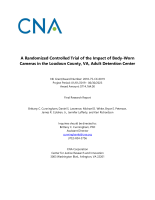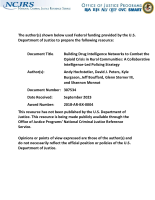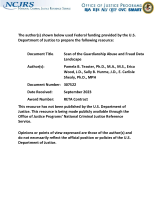Survey Interviews
Police Supervision Redux: Examining Police Supervision in the 21st Century
Exploring the Impact of Station Dog Programs on Agency Wellness and Community Relationships
A Micro-and Macro Evaluation of the Effectiveness of Extreme Risk Protection Orders in Colorado
A Randomized Controlled Trial of the Impact of Body-Worn Cameras in the Loudoun County, VA, Adult Detention Center
An Examination of the Law Enforcement Role in Implementing Extreme Risk Protection Orders
Building Drug Intelligence Networks to Combat the Opioid Crisis in Rural Communities: A Collaborative Intelligence-Led Policing Strategy
Scan of the Guardianship Abuse and Fraud Data Landscape
Caring Connections for Youth: Evaluation of a Countywide Pre-Arrest Diversion Initiative to Reduce Racial/Ethnic Disparities
An Assessment of Dual System Data and Practices Capacity across Juvenile Justice and Child Welfare Systems
Understanding the Quality and Perceived Impacts of SRO Training: An Evaluation of the Largest National Training Provider for School Police
Life-course and Intergenerational Effects of Crime and Criminal Justice Involvement: Identifying Risks and the Search for Resilience
Inclusive Research: Engaging People Closest to the Issue Makes for Better Science & Greater Impact; 2023 NIJ Research Conference Plenary
This panel will discuss what inclusive research is, how to conduct it, and what issues and challenges exist about engaging in it. “Inclusive research” has its history as a participatory research method designed to ensure people closest to the issue or problem under study are authentically engaged in the research process rather than simply being “research subjects.” While community-based participatory research has begun to take on greater prominence in the criminal justice realm, such efforts are largely confined to qualitative research inquiries.
See the YouTube Terms of Service and Google Privacy Policy
The Adaptation and Evaluation of the Fourth R Youth Dating Violence Curriculum for Indigenous Communities
Rethinking revocations: A study to examine the effects of a coaching model on improving outcomes
Safer Schools: Efforts to Improve School Climate in Virginia
Research on Domestic Radicalization to Violent Extremism: Insights from Family and Friends of Current and Former Extremists
Patterns of Surveillance, Control, and Abuse Among a Diverse Sample of Intimate Partner Abuse Survivors
Do Interactions With School Resource Officers Predict Students' Likelihood of Being Disciplined and Feelings of Safety? Mixed-Methods Evidence From Two School Districts
Multilevel Evaluation of Project Safe Neighborhoods
Project Safe Neighborhoods (PSN) is a DOJ-sponsored initiative to reduce violent crime, particularly gun crime, by fostering cooperation by criminal justice agencies and local partners to develop and implement strategic approaches.
See the YouTube Terms of Service and Google Privacy Policy






